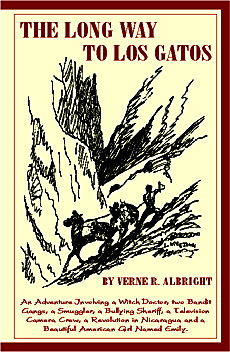|
Along the way, I met smugglers, a famous bullfighter,
a witch doctor, a camera crew from ABC's Wide World of Sports,
a bullying small town sheriff, a snake hunter and a beautiful
American girl named Emily. There were moments of intense danger,
but over the years, my memory has retained those less than some
of the simplest moments.
I suppose the most memorable day was the first.
Before I rode into the desert, the city of Chiclayo held a parade
in my honor. Though there was no drama, it was a day I'll never
forget. Everything was new, and I hadn't yet learned how easy
it would be to fail. The beginning of that day is described below
in an edited excerpt from The Long Way to Los Gatos:
At the entrance to town, I was
met by twenty Paso horses and riders from haciendas in the surrounding
area. Almost immediately, we were joined by a police motorcycle
escort and started our parade through the narrow streets of Chiclayo.
At first, the spectators were
mostly vendors who tended fruit and vegetable carts near the
city's entrance. They watched in silence as the police cleared
the way.
Elsewhere in the world, the
horses certainly would have been the center of attention. They
carried themselves with aristocratic pride, as if leading a conquering
army. Fleet and stylish, their four-beat gaits easily kept pace
with the motorcycles. Each horse handled itself with lively vigor
and was so smooth that the rider seemed to be floating through
the air.
On this particular occasion,
however, the animals attracted little attention, for Peruvians
are accustomed to their National Horse. Most of the attention
was focused on me.
People recognized me from newspaper
articles, and wished me well.
"Que le vaya bien."
"Buen viaje."
As we neared the Central Plaza,
the number of spectators increased. Groups of children tagged
along with our procession shouting, "Pablito. Gringo."
It was somewhat embarrassing.
I hadn't done anything yet. The recognition and honors were undeserved,
given in anticipation of something I hoped to accomplish.
As we neared the city center,
crowds filled the sidewalks, applauding and shouting encouragement.
A small group of attractive young ladies was showing particular
enthusiasm, and I tipped my hat.
"Thank you very much,"
I said, flirting.
"Why do you thank us?"
one of them returned, eyes wickedly sparkling. "We were
applauding the horses, not you!"
Everyone within earshot roared
with laughter, and then all eyes turned to me. Peruvians love
word games, and people were anxious to see if I was any good
at them.
My mind went blank until I remembered
that something very similar had happened to Alfredo Elias, a
Peruvian friend of mine.
"I know, but my horses
can't talk, and I'm answering for them," I took Alfredo's
words for my own.
The crowd laughed, louder than
before. Then attention returned to the girls. They had no retort,
fortunately for me!
I didn't make it to Los Gatos unchanged. My
ride lasted only as long as a single school year, but I learned
more than I'd ever learned in a like period of formal schooling.
Along the way, some people were far from hospitable,
but most were kind beyond belief. I'd always been too proud to
ask for people's help, but the Latin Americans didn't wait to
be asked. They volunteered, and by the time I got home, my opinion
of my fellow man had changed completely. And so had I!
Of the many paths my life could have taken,
the right one for me began when I had that crazy urge to take
the long way to Los Gatos.
|
|
Not long before I met "the last of the true
gentlemen," I ran into some men who were anything but. A
gang of bandits suddenly appeared behind me in a remote Andean
village, at the end of a long, hard day. It was a moment of very
real danger, as shown by the following edited excerpt from my
book, The Long Way
to Los Gatos:
Later that afternoon, while
passing through a small town, I sensed that I was being followed.
People frequently followed me. Most of the time, they were polite
enough to require some sort of acknowledgement before approaching,
and when denied this, they'd give up and go away.
But this time was different.
The man behind me didn't go away. Instead, he was joined by a
companion and then another and another, until there were six,
in dirty suits and various stages of inebriation. I comforted
myself by observing that the mules they rode were small and scrawny.
Meanwhile, I moved my horses into a faster walk and kept my eyes
peeled in vain for an army post or police station.
At the city limits, I wondered
at the wisdom of continuing into the unpopulated area ahead,
but what else could I do? Stopping would make
things even worse, and turning back to town also had a downside.
The group behind me had grown from one to six in that very town,
and given the chance, it might grow even larger.
A little ways from town, the
leader put his mule into a fast trot and came up alongside me.
Making an obvious attempt to sound authoritative, he announced
that he was "the law" in the town I had just left.
"It will be necessary for
you to show me your passport and the contents of your bags,"
he demanded.
"Do you have anything to
show your authority?" I asked, turning to look his way without
slowing my horses.
"I'm not making requests!
I'm giving orders!" was the stern reply.
"How do I know you have
the right to give orders?"
"Senor, you must stop your
horses at once!"
"As soon as I see proof
of your authority."
We were temporarily at a stalemate,
and neither spoke for a moment. Obviously the "law"
wouldn't or couldn't prove his authority. Considering the size
of his "deputies" and the dubious speed of their mules,
I wasn't about to be talked down off my horse. My resolve was
all the stronger because I had the impression that the men behind
us would abandon their mission, unless it proved effortless.
The man at my side, however,
was the kind who sees things through! He repeatedly ordered me
to stop and dismount. I kept the mares a few steps ahead of his
mule and double-talked him, hoping he'd tire of the game and
go home.
Unfortunately, he didn't.
Instead, he suddenly turned
his mule and jumped her between my horses, grabbing the pack
horse's lead rope. I was holding the free end, not
wishing to risk more broken parts by tying it to my saddle. I
stopped my mount and turned her to face him. One last time -
half-hoping that he would produce a convincing badge - I repeated
that no one would see my passport or baggage without proof of
authority. Again we were at a stalemate, but my situation had
worsened. I was no longer moving, and the other five men were
getting in position to surround me.
Obviously I came through my run-in with the
bandits, but not before it took some unexpected twists and turns.
You'll enjoy reading about them in The Long Way to Los Gatos.
IMPORTANT NOTE: Any individual or organization
is welcome to reprint or otherwise distribute the above material
under the strict conditions that the author be credited and that
the Internet addresses of this Web Site and the American Association
of Owners and Breeders of Peruvian Paso Horses appear at the
end of the article (see below).
|

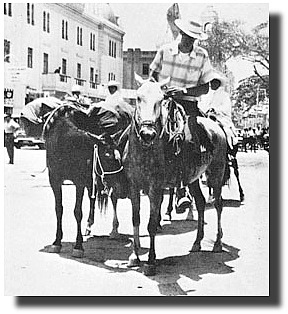
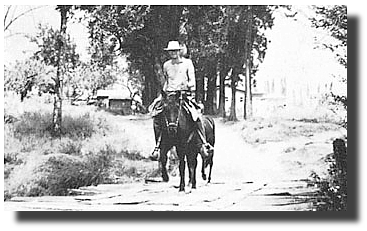 people
competed for the honor of hosting my horses and me.
people
competed for the honor of hosting my horses and me.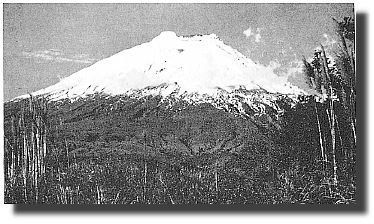 A
Peace Corps nurse told me that I was at risk equally as much
as my horses. She then gave me a list of the diseases against
which I needed to take precautions: malaria, tuberculosis, typhoid,
cholera and bubonic plague, diseases I thought existed only in
history books and horror stories.
A
Peace Corps nurse told me that I was at risk equally as much
as my horses. She then gave me a list of the diseases against
which I needed to take precautions: malaria, tuberculosis, typhoid,
cholera and bubonic plague, diseases I thought existed only in
history books and horror stories.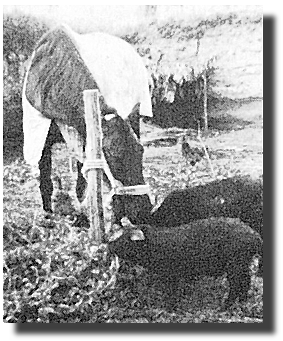 I was hosted by the richest man in
Peru. When things turned bad, I slept in tool sheds, chicken
coops, feed troughs and empty jail cells. In Peru I dined on
some of the best food I'd ever eaten, but afterwards I was reduced
to eating anything from goat jaw to guinea pig. My horses dined
on a similarly exotic menu, including bananas, coconut, sugar
cane, flour and corn stalks.
I was hosted by the richest man in
Peru. When things turned bad, I slept in tool sheds, chicken
coops, feed troughs and empty jail cells. In Peru I dined on
some of the best food I'd ever eaten, but afterwards I was reduced
to eating anything from goat jaw to guinea pig. My horses dined
on a similarly exotic menu, including bananas, coconut, sugar
cane, flour and corn stalks.